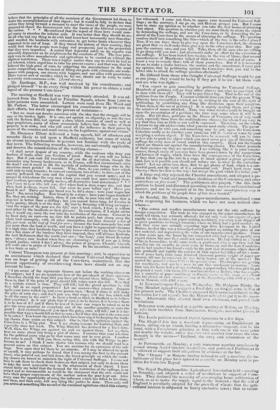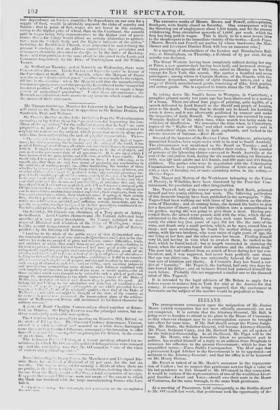The Royal Buckinghamshire Agricultural Association held a meeting on Saturday,
and adopted a series of rmathlti,111s in support of The Royal Buckinghamshire Agricultural Association held a meeting on Saturday, and adopted a series of rmathlti,111s in support of laws. They They declared the necessity of eaeouraging home cultivation of wheat, so as to make the supply equal to the demand ; that the soil of England is peculiarly adapted for the growth of wheat; that the agri- cultural interest is subjected to heavy exclusive taxes ; that to substi- tute dependence on foreign countries for dependence on our own for a supply of food, would in ,!alculably augment the risks of scarcity and famine ; that in point of fact, wages are not lower in this country, ' owing to the higher price of wheat, than on the Continent, the amount paid in wages being fully commensurate to the higher cost of provi- sions ; that a fixed duty would afford no certain protection to agricul- ture : that the " whole body and the highest interests of the nation," including the Established Church, were concerned in maintaining the present Corn-laws ; that an address embodying these principles and statements should be presented to the Que-n by the Duke of Bucking- ham : and that petitions to the sane: effect he presented to the Lords and Commons respectively by the Duke of Buckingham and Sir William Youngs
At Stafford on Tuesday, and at Norwich on Wednesday, there were Con ow vat'ye din»ers. Lords Sdn•lon and Ingeatrie spol.:e in flivour of the Cora-laws at Stafford. At Norwich, where the Marquis of Douro
was the most " distinguished guest." no all was made to the subject,
till late the evening when- Mr. Bign old said that the manufacturing
interest Iva.: pn isperoos : nod this prosperity he attributed to t he "somewhat doted position " of Norwich, " which enabled them to supply a large croon of agriculture! population." Coder these eirstonstamees, the Is;orivich manuthet liver; were averse to any measure which would reduce the means of their ens•tomers.



























 Previous page
Previous page